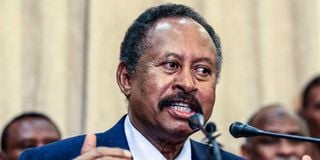Premium
Deaths, injuries in troubled Sudan as PM Hamdok quits

Mr Abdalla Hamdok who resigned as Sudan's prime minister. Protests against military rule surged following his resignation.
At least three people were killed and dozens wounded by live bullets and tear gas canisters on Sunday in Khartoum’s twin city of Omdurman as protests surged on the day Prime Minister Abdalla Hamdok resigned.
The Sudanese security forces fired tear gas, ostensibly to prevent the protesters from reaching the presidential palace in central Khartoum, in the continuation of the wave of demonstrations calling for the withdrawal of the army from political life.
In response to the call of the resistance committees and the Sudanese Professionals Association, thousands demonstrated in Khartoum and other cities as part of the so-called "Millions of Martyrs" to demand civilian rule and condemn the killing of demonstrators during last week's protests. But the security forces tried to confront the protesters when they reached the street leading to the presidential palace.
Prime Minister Hamdok, who had returned to the position in November 2021 following a coup earlier in October, decided to resign, having failed to bridge the gap between the military and civilian protesters.
Appeal to doctors
The crackdown by the military on the protesters worsened this week with the Sudanese Professionals Association appealing to doctors, surgeons and nurses to go to Omdurman and the capital's hospitals to treat the injured and provide the necessary medical services.
Since the early hours of Sunday morning, hybrid security forces have deployed extensively in the centre of the capital and at the entrances to the main bridges linking the three cities of the capital Khartoum, Omdurman and Khartoum North, which were closed.
The United States and the United Nations condemned the "fatal" force used by the Sudanese authorities against peaceful protesters and demanded respect for human rights and an end to violations.
For more than two months, Sudanese streets has witnessed continuous protests in rejection of the measures taken by the army chief, Abdel Fattah Al-Burhan, on October 25 when he overthrew the civilian component, declared a state of emergency and dissolved the Sovereignty Council and the Council of Ministers.
These measures were met with popular protests that are still continuing, despite the use of force against demonstrators.





